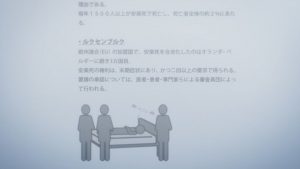 Babylon is back after a three-week hiatus, which was just long enough to let me forget a lot of what happened in the triple-length premiere. I don’t know if this is a thing now or what, but extra-long openers followed by long hiatuses are not, IMHO, a great way to introduce a series. With Vinland Saga it didn’t matter so much because its triple-episode was phenomenal and thus, totally memorable. With Babylon, which was more on the order of “pretty good”, it’s an annoyance if nothing else.
Babylon is back after a three-week hiatus, which was just long enough to let me forget a lot of what happened in the triple-length premiere. I don’t know if this is a thing now or what, but extra-long openers followed by long hiatuses are not, IMHO, a great way to introduce a series. With Vinland Saga it didn’t matter so much because its triple-episode was phenomenal and thus, totally memorable. With Babylon, which was more on the order of “pretty good”, it’s an annoyance if nothing else.
 This series is interesting, there’s no question about that. Merely not being a product of the cookie cutter sets it apart from a good chunk of the schedule these days, and it’s trading in some pretty interesting ideas that are normally a third rail in Japan, never mind anime. In a country where the normal response to mental health matters is “don’t talk about it” anything related to the extraordinarily high suicide rate is usually a taboo subject. And the rampant corruption of the ruling Liberal Democratic (a misnomer if ever one existed) Party is so entrenched and accepted that any attempt to represent it in anime is an extreme rarity.
This series is interesting, there’s no question about that. Merely not being a product of the cookie cutter sets it apart from a good chunk of the schedule these days, and it’s trading in some pretty interesting ideas that are normally a third rail in Japan, never mind anime. In a country where the normal response to mental health matters is “don’t talk about it” anything related to the extraordinarily high suicide rate is usually a taboo subject. And the rampant corruption of the ruling Liberal Democratic (a misnomer if ever one existed) Party is so entrenched and accepted that any attempt to represent it in anime is an extreme rarity.
 My biggest complaint with the first three episodes was director Suzuki Kiyataka’s rather overbearing film school flourishes trying to pass themselves off as auteur stylings. He stepped off the gas a bit in Episode 4, so hopefully that’ll be less of an issue going forward. And my biggest concern with Babylon is that writer Nozaki Mado has a history of developing interesting ideas that go absolutely nowhere. But history is history, and it can’t be assumed that it will repeat itself with Babylon. So truthfully, all in all this was a pretty good episode and the series has done a good job setting up its story.
My biggest complaint with the first three episodes was director Suzuki Kiyataka’s rather overbearing film school flourishes trying to pass themselves off as auteur stylings. He stepped off the gas a bit in Episode 4, so hopefully that’ll be less of an issue going forward. And my biggest concern with Babylon is that writer Nozaki Mado has a history of developing interesting ideas that go absolutely nowhere. But history is history, and it can’t be assumed that it will repeat itself with Babylon. So truthfully, all in all this was a pretty good episode and the series has done a good job setting up its story.
 It’s hard to know what Itsuki’s game with the suicide law is yet, and in fact we don’t even know if there’s something paranormal going on with Magase Ai and the whole suicide plotline (though Mado’s history suggests there is). It’s easy to wonder if Seizaki-san’s new assistant Sekuro Hiasa (Ichimichi Mao) – niece of the justice minister – is in fact Magase (though I suspect that’s too obvious), since giving her shapeshifting ability is pretty much a writing cheat. Sekuro-san certainly does her bit in acting suspicious – I haven’t seen so much rapid eye movement outside of a university sleep study.
It’s hard to know what Itsuki’s game with the suicide law is yet, and in fact we don’t even know if there’s something paranormal going on with Magase Ai and the whole suicide plotline (though Mado’s history suggests there is). It’s easy to wonder if Seizaki-san’s new assistant Sekuro Hiasa (Ichimichi Mao) – niece of the justice minister – is in fact Magase (though I suspect that’s too obvious), since giving her shapeshifting ability is pretty much a writing cheat. Sekuro-san certainly does her bit in acting suspicious – I haven’t seen so much rapid eye movement outside of a university sleep study.
 As I noted suicide is a touchy issue here, and it does seem as if Babylon is going to tackle it head-on – it may in fact be the central theme of the entire series. If so that takes real guts so credit where it’s due, though it remains to be seen if this staff has to chops to offer any meaningful insight on the problem. Equally interesting to me is the matter of Shiniki as a kind of full-scale testing ground for deregulation and strange laws, a thread with a lot of potential to be sure. It seems to me that in setting this experimental zone up the way they have the too-clever by half powers behind Shiniki were pretty much asking for something like this to happen, and we’s already seeing evidence that Seizaki is going to be drawn into the raw sewage of Japanese politics – an environment for which he’s clearly very ill-equipped.
As I noted suicide is a touchy issue here, and it does seem as if Babylon is going to tackle it head-on – it may in fact be the central theme of the entire series. If so that takes real guts so credit where it’s due, though it remains to be seen if this staff has to chops to offer any meaningful insight on the problem. Equally interesting to me is the matter of Shiniki as a kind of full-scale testing ground for deregulation and strange laws, a thread with a lot of potential to be sure. It seems to me that in setting this experimental zone up the way they have the too-clever by half powers behind Shiniki were pretty much asking for something like this to happen, and we’s already seeing evidence that Seizaki is going to be drawn into the raw sewage of Japanese politics – an environment for which he’s clearly very ill-equipped.

























